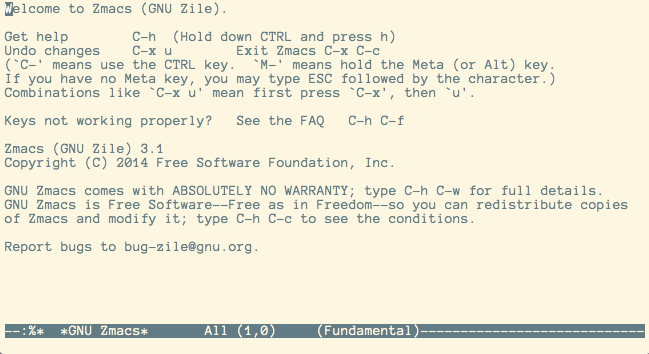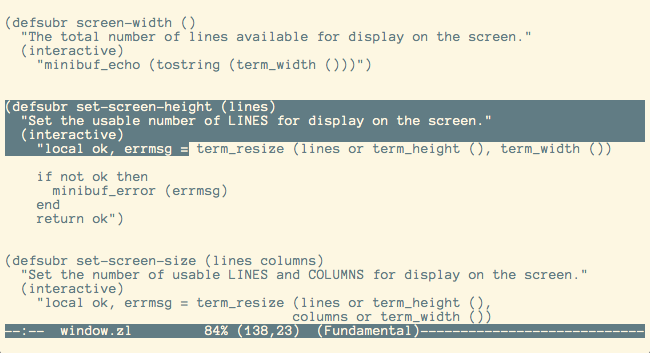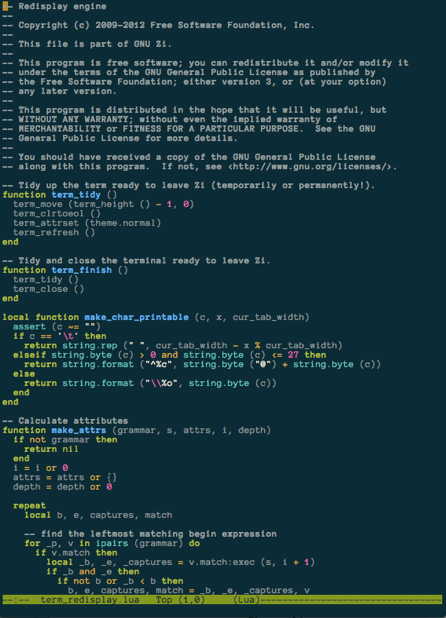GNU Zile

GNU Zile is a text editor development kit, so that you can (relatively) quickly develop your own ideal text editor without reinventing the wheel for many of the common algorithms and data-structures needed to do so.
It comes with an example implementation of a lightweight Emacs clone, called Zemacs. Every Emacs user should feel at home with Zemacs. Zemacs is aimed at small footprint systems and quick editing sessions (it starts up and shuts down instantly).
More editors implemented over the Zile frameworks are forthcoming as the data-structures and interfaces improve: Zz an emacs inspired editor using Lua as an extension language; Zee a minimalist non-modal editor; Zi a lightweight vi clone; and more...
Zile is a collection of algorithms and data-structures that currently support all basic Emacs-like editing features: it is 8-bit clean (though Unicode support is not ready yet), and the number of editing buffers and windows is only limited by available memoryand screen space respectively. Registers, minibuffer completion and auto fill are available.
Zemacs implements a subset of Emacs with identical function and variable names, continuing the spirit of the earlier Zile editor implemented in C.
Downloading Zile
Zile can be found on the main GNU ftp server: http://ftp.gnu.org/gnu/zile/ (via HTTP) and ftp://ftp.gnu.org/gnu/zile/ (via FTP). It can also be found on the GNU mirrors; please use a mirror if possible.
Documentation
Like Emacs, Zemacs is self-documenting: it has built-in help on its features. It also comes with a brief man page, obtained by running man zemacs, and a FAQ, which can be found by running zemacs and typing the key-sequence C-h C-F.
Screenshots
Zemacs' splash screen
Zemacs is a lightweight Emacs clone; even its splash screen is very Emacs-like:

Selecting a region in Zemacs
Zemacs highlights the selected region, shown here editing some of the zlisp source code that implements set-screen-height:

Zz Syntax Highlighting Proof-of-Concept
Zz is another editor built using Zile, here using experimental Lua syntax-highlighting:

Mailing lists
Zile has two mailing lists: <help-zile@gnu.org> and <bug-zile@gnu.org>.
The main discussion list is <bug-zile@gnu.org>, and is used to discuss most aspects of Zile, including development and enhancement requests, as well as bug reports.
There is a separate list for general user help and discussion, <help-zile@gnu.org>.
Announcements about Zile and most other GNU software are made on <info-gnu@gnu.org>.
To subscribe to these or any GNU mailing lists, please send an empty mail with a Subject: header of just subscribe to the relevant -request list. For example, to subscribe yourself to the GNU announcement list, you would send mail to <info-gnu-request@gnu.org>. Or you can use the mailing list web interface.
Getting involved
Development of Zile, and GNU in general, is a volunteer effort, and you can contribute. For information, please read How to help GNU. If you'd like to get involved, it's a good idea to join the discussion mailing list (see above).
Development
For development sources, bug and patch trackers, and other information, please see the Zile project page at savannah.gnu.org.
Maintainer
Zile is currently being maintained by Gary V. Vaughan. Please use the mailing lists for contact.
Licensing
Zile is free software; you can redistribute it and/or modify it under the terms of the GNU General Public License as published by the Free Software Foundation; either version 3 of the License, or (at your option) any later version.
![[A GNU head]](/graphics/heckert_gnu.small.png) GNU Operating System
GNU Operating System![[FSF logo]](/graphics/fsf-logo-notext.png)